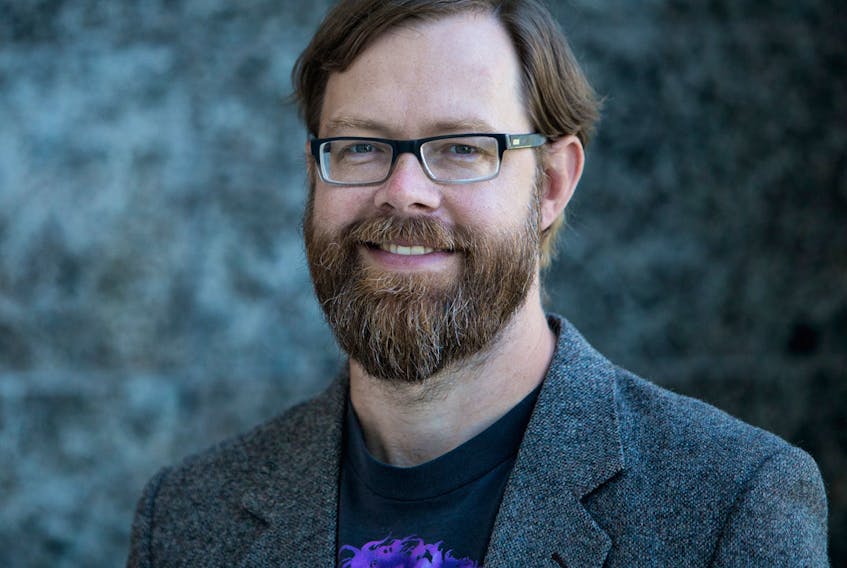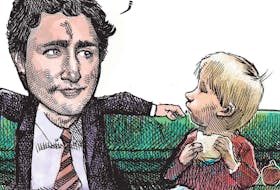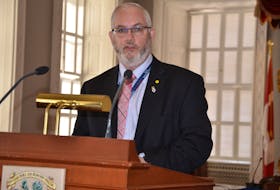It’s still got me rattled.
Because it has the possibility of explaining so much.

Why the province started Muskrat Falls in the first place. Why the provincial government can continue to claim there’s some magical method to painlessly mitigate power rates when Muskrat Falls comes online with mythical money no one will miss. Why we’re buying into massive open-pen net aquaculture. Why governments make snap decisions, and then claim that everything was fully studied and researched, even though no one seems to be able to offer up that research when they get questioned on it.
Why so many, many things.
And it’s just an offhand quip, four little words from a former senior provincial civil servant in a report prepared for the Muskrat Falls Inquiry by Memorial University professor Kelly Blidook.
“We joke about ‘decision-based evidence making’…” When the assistant deputy minister (current or former ADM, it’s not clear) said that during an interview with Blidook, the ADM did say it wasn’t the norm for all decisions.
It is, of course, a play on the idea of evidence-based decision making: that’s where you gather all the evidence you can and use it to come to the best possible conclusion. You don’t start with a preferred choice of action — you end with one, once all the facts are in.
If you accept only the evidence that supports your hypothesis, your hypothesis can never be anything but the right one. Until, startlingly, it isn’t.
Blidook quotes other provincial officials as saying similar things, but in different ways.
“It changed quite a lot actually, before I left. It was like ‘here’s what we’re going to do, so write a note that says how we’re going to do it,’” one director was quoted as saying. “Sometimes, not with everything, but sometimes, I received the impression that the decision was already made as to what the course of action would be, maybe before I ever even heard of it.”
In police investigations, they call it tunnel vision, and it has caused scores of wrongful convictions. You decide who your chief suspect is, and then, consciously or unconsciously, place any subsequent evidence in order accordingly. If the evidence suggests the guilt of the person you think did it, that evidence gets more weight. If it doesn’t, you discount it. Problem is, it’s a recipe for making the wrong choice and sending the wrong person to jail.
If you accept only the evidence that supports your hypothesis, your hypothesis can never be anything but the right one. Until, startlingly, it isn’t.
That certainly seems to be the score on Muskrat Falls: in hindsight, you can look back and see the warnings even in studies that were used to defend Muskrat Falls at the outset. The way things were couched to suggest there were risks — but those risk were simply set to the side as “negativism.”
The cure? “I think it needs to come from the top. Public service needs to feel that their views are welcomed, first off. And that there will be no consequences to offering a professional opinion on a file,” Blidook quotes a deputy minister as saying.
Another quote? “The premier of the province, his office has to almost re-establish a culture of speaking truth to power.”
But where did that culture of speaking truth to power go, and when? That’s what the civil service is supposed to do — they’re not there to make decisions, but to provide the unbiased evidence needed for the politicians to make decisions. The very definition of speaking truth to power.
“Just give me the evidence to support the conclusion I’ve already come to” is not evidence-based decision-making.
It also sounds like a cosmically stupid course of action.
But, if that’s where we are, it would explain a lot.
Russell Wangersky’s column appears in 36 SaltWire newspapers and websites in Atlantic Canada. He can be reached at [email protected] — Twitter: @wangersky.
MORE FROM RUSSELL WANGERSKY
• Paying the price for political ambition
• A natural remedy









